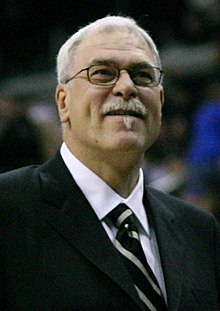 Jackson in 2009 | |
| Personal information | |
|---|---|
| Born | September 17, 1945 Deer Lodge, Montana, U.S. |
| Listed height | 6 ft 8 in (2.03 m) |
| Listed weight | 220 lb (100 kg) |
| Career information | |
| High school | Williston (Williston, North Dakota) |
| College | North Dakota (1964–1967) |
| NBA draft | 1967: 2nd round, 17th overall pick |
| Selected by the New York Knicks | |
| Playing career | 1967–1980 |
| Position | Power forward |
| Number | 18, 17 |
| Coaching career | 1978–2011 |
| Career history | |
| As player: | |
| 1967–1978 | New York Knicks |
| 1978–1980 | New Jersey Nets |
| As coach: | |
| 1978–1981 | New Jersey Nets (assistant) |
| 1982–1987 | Albany Patroons |
| 1984 | Piratas de Quebradillas |
| 1984–1986 | Gallitos de Isabela |
| 1987 | Piratas de Quebradillas |
| 1987–1989 | Chicago Bulls (assistant) |
| 1989–1998 | Chicago Bulls |
| 1999–2004, 2005–2011 | Los Angeles Lakers |
| Career highlights and awards | |
As player:
As head coach:
| |
| Career NBA playing statistics | |
| Points | 5,428 (6.7 ppg) |
| Rebounds | 3,454 (4.3 rpg) |
| Assists | 898 (1.1 apg) |
| Stats at NBA.com | |
| Stats at Basketball Reference | |
| Career coaching record | |
| NBA | 1,155–485 (.704) |
| Basketball Hall of Fame as coach | |
Philip Douglas Jackson (born September 17, 1945) is an American former professional basketball player, coach, and executive. A power forward, Jackson played 12 seasons in the National Basketball Association (NBA), winning championships with the New York Knicks in 1970 and 1973.[1] Regarded as one of the greatest coaches of all time, Jackson was the head coach of the Chicago Bulls from 1989 to 1998, leading them to six NBA championships. He then coached the Los Angeles Lakers from 1999 to 2004 and again from 2005 to 2011; the team won five league titles under his leadership. Jackson's 11 NBA titles as a coach surpassed the previous record of nine set by Red Auerbach. He holds numerous other records as a coach, such as most postseason wins (229), and most NBA Conference titles (13).[2]
Jackson is known for his use of Tex Winter's triangle offense as well as a holistic approach to coaching that was influenced by Eastern philosophy, garnering him the nickname "Zen Master". Jackson cited Robert Pirsig's book Zen and the Art of Motorcycle Maintenance as one of the major guiding forces in his life. He also applied Native American spiritual practices as documented in his book Sacred Hoops.[3] He is the author of several candid books about his teams and his basketball strategies. In 2007, Jackson was inducted into the Basketball Hall of Fame.[4] In 1996, as part of celebrations for the NBA's 50th anniversary, Jackson was named one of the 10 greatest coaches in league history.[5][6][7]
Jackson retired from coaching in 2011 and joined the Knicks as an executive in March 2014. He was dismissed as the Knicks' team president in 2017.
- ^ Ramona Shelburne (May 10, 2011). "Tense moments in Lakers' last stand". ESPN. Retrieved January 4, 2013.
- ^ Kalbrosky, Bryan (February 8, 2021). "Phil Jackson again has the best winning percentage in history among NBA coaches". HoopsHype. Retrieved November 25, 2023.
- ^ "Basketball Court Zen". PBS NewsHour. Retrieved August 1, 2015.
- ^ "RealGM: Wiretap Archives: Jackson And Williams Lead HOF Class". Archived from the original on April 28, 2007.
- ^ "Top 10 Coaches in NBA History". NBA.com. Retrieved August 29, 2009.
- ^ Broussard, Chris. (June 16, 2009). "X marks the spot of greatest NBA coach". ESPN. Retrieved July 31, 2015.
- ^ Dan Callagy. "Red Auerbach-Phil Jackson: Who's the Best NBA Coach of All Time?". Bleacher Report. Retrieved December 20, 2014.